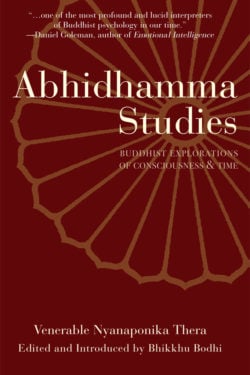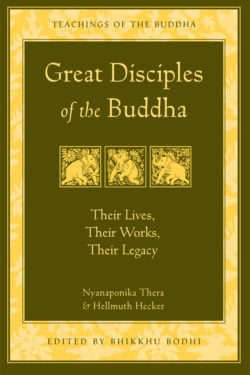Nyanaponika Thera

Nyanaponika Thera, a German-born Buddhist monk, was a scholar, translator, and founder of The Buddhist Publication Society in Sri Lanka. Thera died in 1994 at the age of 93.
Books, Courses & Podcasts
Abhidhamma Studies
The Abhidhamma, the third great division of early Buddhist teaching, expounds a revolutionary system of philosophical psychology rooted in the twin Buddhist insights of selflessness and dependent origination. In keeping with the liberative thrust of early Buddhism, this system organizes the entire spectrum of human consciousness around the two poles of Buddhist doctrine—bondage and liberation, Samsara and Nirvana—the starting point and the final goal. It thereby maps out, with remarkable rigour and precision, the inner landscape of the mind to be crossed through the practical work of Buddhist meditation.
In this book of groundbreaking essays, Venerable Nyanaponika Thera, one of our age’s foremost exponents of Theravada Buddhism, attempts to penetrate beneath the formidable face of the Abhidhamma and to make its principles intelligible to the thoughtful reader of today. His point of focus is the Consciousness Chapter of the Dhammasangani, the first treatise of the Abhidhamma Pitaka. Basing his interpretation on the detailed list of mental factors that the Abhidhamma uses as a guide to psychological analysis, he launches into bold explorations in the multiple dimensions of conditionality, the nature of consciousness, the temporality of experience, and the psychological springs of spiritual transformation. Innovative and rich in insights, this book does not merely open up new avenues in the academic study of early Buddhism. By treating the Abhidhamma as a fountainhead of inspiration for philosophical and psychological inquiry, it demonstrates the continuing relevance of Buddhist thought to our most astute contemporary efforts to understand the elusive yet so intimate nature of the mind.
Great Disciples of the Buddha
A perennial favorite, Great Disciples of the Buddha is now relaunched in our best-selling Teachings of the Buddha series.
Twenty-four of the Buddha’s most distinguished disciples are brought to life in ten chapters of rich narration. Drawn from a wide range of authentic Pāli sources, the material in these stories has never before been assembled in a single volume. Through these engaging tales, we meet all manner of human beings—rich, poor, male, female, young, old—whose unique stories are told with an eye to the details of ordinary human concerns. When read with careful attention, these stories can sharpen our understanding of the Buddhist path by allowing us to contemplate the living portraits of the people who fulfilled the early Buddhist ideals of human perfection. The characters detailed include:
- Sāriputta
- Nandā
- Mahāmoggallāna
- Mahākassapa
- Ānanda
- Isidāsī
- Anuruddha
- Mahākaccāna
- Aṅgulimāla
- Visākhā
- and many more.
Conveniently annotated with the same system of sutta references used in each of the other series volumes, Great Disciples of the Buddha allows the reader to easily place each student in the larger picture of Buddha’s life. It is a volume that no serious student of Buddhism should miss.
- Learn more about the Teachings of the Buddha series.


